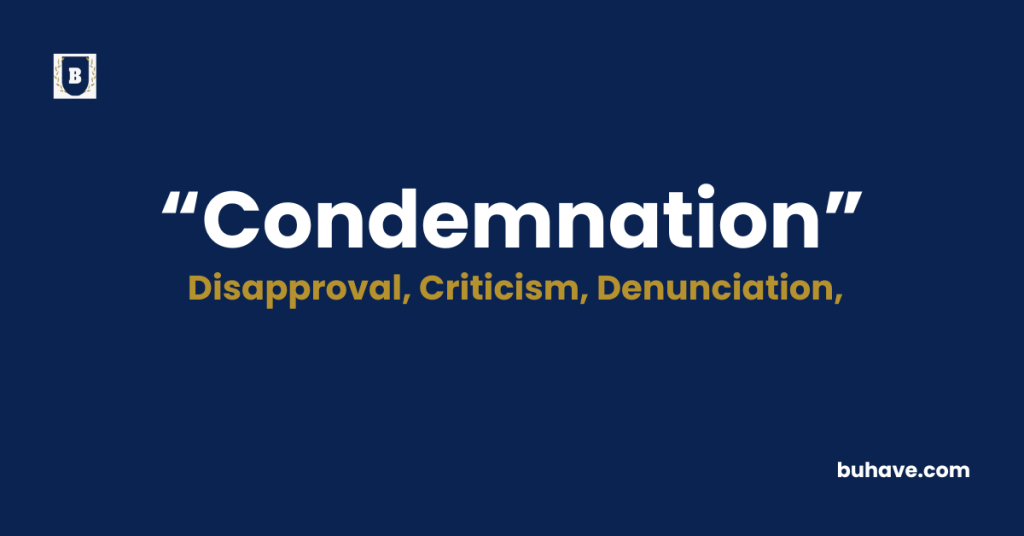The word Condemnation (Noun) refers to the expression of strong disapproval, often involving moral or legal judgment. In this guide, you’ll learn the full definition, synonyms, antonyms, etymology, and real-life examples of how to use Condemnation correctly in sentences.
Condemnation Explained in Depth
A complete and detailed guide to the word Condemnation including meaning, definition, examples, etymology, synonyms, and antonyms.
Meanings of Condemnation
Condemnation means a firm expression of disapproval, often aimed at actions, behaviors, or ideas considered wrong, harmful, or immoral. It may involve legal, ethical, or emotional judgment.
Definition
Condemnation is the act of declaring something or someone as wrong, evil, or unacceptable. This term can be used in various contexts from official legal declarations to moral or social judgments. In legal settings, condemnation might refer to a court’s verdict that finds someone guilty. In everyday use, it often involves strong criticism, particularly of actions that violate societal or ethical norms.
For example, a government may issue a formal condemnation of violent acts, expressing collective outrage and rejecting such behavior. Socially, condemnation may occur when communities denounce hate speech or injustice. It can also have a psychological impact, especially when directed at individuals repeatedly. In both formal and informal use, the strength of the word carries a heavy emotional and moral tone.
Etymology
The word “condemnation” comes from the Latin term condemnatio, which is derived from condemnare, meaning “to sentence, convict, or blame.” This Latin root combines con- (intensive prefix) with damnare (to inflict loss, damage, or penalty). It passed into Old French as condempnation, then entered Middle English in the 14th century. Historically, condemnation was closely tied to religious or legal contexts, where it referred to divine punishment or judicial rulings. Over time, its use broadened to include social and political critique. Today, the word still retains its intensity and is frequently used in public discourse to signify strong disapproval or moral rejection of harmful actions, policies, or ideologies.
Example Sentences
- The leader’s speech included a strong condemnation of all forms of discrimination.
- International condemnation followed the country’s decision to violate human rights agreements.
- Her public condemnation of corruption earned her widespread respect.
Condemnation Synonyms
- Denunciation
- Censure
- Criticism
- Rebuke
- Reprimand
- Disapproval
- Blame
- Judgment
- Conviction
- Objection
Condemnation Antonyms
- Praise
- Approval
- Endorsement
- Support
- Commendation
- Acceptance
- Sanction
- Recognition
- Acquittal
- Validation
FAQs about Condemnation
Here’s a FAQ-style guide about the word “Condemnation”
1. What does “condemnation” mean?
It refers to the act of declaring something wrong or morally unacceptable, often with strong disapproval.
2. Is condemnation always negative?
Yes. It expresses strong disapproval and typically highlights serious flaws or wrongdoing.
3. Can condemnation be formal?
Absolutely. Legal systems, governments, and organizations can all issue formal condemnations.
4. How is condemnation different from criticism?
Criticism can be mild or constructive, while condemnation implies intense or moral rejection.
5. Can condemnation have social consequences?
Yes. It may lead to public shaming, legal action, or loss of support in communities or institutions.

















